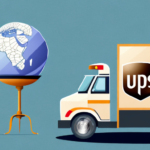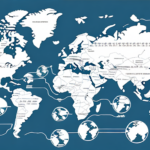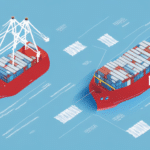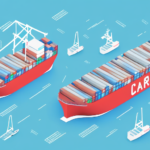Understanding UPS Worldwide Express Freight: International Import Billing with Third-Party Accounts
UPS Worldwide Express Freight is a premium international shipping service offered by UPS, designed to provide reliable and swift transportation of heavy freight and large shipments across borders. If you plan to utilize UPS Worldwide Express Freight for your global shipments, understanding the various billing options, including third-party billing accounts, is crucial. In this article, we will explore what UPS Worldwide Express Freight entails, how it operates, and the benefits it offers for international shipping. Additionally, we will examine third-party billing accounts and their role in managing the UPS Worldwide Express Freight International Import Bill.
What is UPS Worldwide Express Freight and How Does It Operate?
UPS Worldwide Express Freight is a specialized shipping service provided by UPS that caters to businesses needing to transport large packages and heavy freight across international borders. It is ideal for companies that require quick and dependable delivery services for high-value or time-sensitive goods. The service operates through a global network, offering door-to-door delivery to over 220 countries and territories worldwide.
The service utilizes a hub-and-spoke model, involving the sorting and consolidation of packages at regional hubs before forwarding them to their final destination. This methodology enhances the efficiency and speed of deliveries, ensuring timely arrival of shipments.
One of the standout features of UPS Worldwide Express Freight is its time-definite delivery options. Customers can select from various delivery timelines, including next-day, second-day, and third-day delivery, depending on their specific requirements. This flexibility enables businesses to meet tight deadlines and guarantee that their products reach their destinations on schedule.
Beyond its expedited delivery services, UPS Worldwide Express Freight also offers a suite of value-added services such as customs clearance assistance, insurance coverage, and advanced shipment tracking. These services help businesses streamline their shipping processes, ensuring that their goods are delivered safely, securely, and with full visibility throughout transit.
The Benefits of Using UPS Worldwide Express Freight for International Shipping
There are several advantages to utilizing UPS Worldwide Express Freight for your international shipping needs:
- Fast and Reliable Delivery: The service can transport goods from one country to another in as little as one to three business days, making it ideal for urgent shipments.
- Enhanced Security and Tracking: UPS provides end-to-end tracking of your shipment, allowing you to monitor its progress from origin to destination. Additionally, the service offers insurance coverage of up to $100,000 for lost or damaged goods.
- Cost Savings: UPS Worldwide Express Freight offers volume discounts on shipping rates. Its efficient hub-and-spoke model reduces the likelihood of delays, missed deliveries, or damaged goods, potentially saving businesses money in the long run.
- Customs Expertise: With an extensive network of customs brokers and clearance experts, UPS ensures that shipments are processed quickly and efficiently through customs, minimizing delays and additional fees.
- Sustainability: UPS is committed to reducing its environmental impact by offering carbon-neutral shipping options, eco-friendly packaging materials, and recycling programs.
According to UPS's 2023 annual report, UPS handles over 21 million shipments daily, reaffirming its capacity and reliability in the international freight market.
A Guide to Understanding the UPS Worldwide Express Freight International Import Bill Third Party
The UPS Worldwide Express Freight International Import Bill Third Party is a billing option designed for businesses that use third-party logistics providers (3PLs) to manage their shipping needs. This billing account allows the logistics provider to handle the payment of the International Import Bill on behalf of the business, streamlining the billing process and providing greater visibility and control over shipping costs.
With the third-party billing option, the logistics provider receives a separate bill for each shipment and manages payment through their own account. They have the flexibility to either pay the bill directly or pass the cost along to the business, depending on the agreed terms.
It's important to note that businesses must already have an established relationship with their third-party logistics provider to utilize the UPS Worldwide Express Freight International Import Bill Third Party option. Additionally, businesses should regularly review their billing statements to ensure accuracy and prevent unexpected charges. By leveraging this billing option, businesses can simplify their shipping processes and focus on core operational activities.
How to Read and Interpret the UPS Worldwide Express Freight International Import Bill Third Party
Understanding the UPS Worldwide Express Freight International Import Bill Third Party can initially seem complex, but with a basic understanding of the charges and fees, it becomes manageable.
The bill typically includes a detailed breakdown of charges, such as:
- Shipping Costs: The base rate for transporting the freight.
- Customs Fees: Charges imposed by the destination country's customs authority.
- Taxes: Applicable import taxes based on the value and type of goods.
- Additional Services: Fees for services like storage, insurance, or expedited handling.
Furthermore, the logistics provider may receive separate bills for any extra services requested. It's crucial to review the bill meticulously to ensure that all charges are accurate and justified. If there are any discrepancies or errors, contacting UPS customer service promptly is recommended to resolve the issue.
What is a Third-Party Billing Account and How Does It Work with UPS Worldwide Express Freight?
A third-party billing account is a billing option available to businesses that employ third-party logistics providers to manage their shipping operations. This account allows the logistics provider to handle the payment of the UPS Worldwide Express Freight International Import Bill on behalf of the business, thereby simplifying the billing process and providing enhanced oversight of shipping expenditures.
Under this billing arrangement, the logistics provider receives individual bills for each shipment and processes payments through their own account. They have the discretion to either cover the costs directly or pass them onto the business, depending on their internal procedures and agreements.
One notable advantage of using a third-party billing account is the potential for businesses to save time and resources. The logistics provider manages all billing and payments, eliminating the need for businesses to juggle multiple bills and transactions for each shipment. This allows businesses to concentrate on other vital tasks without getting bogged down by the complexities of shipping billing.
Additionally, third-party billing can assist businesses in negotiating better shipping rates with UPS. Logistics providers managing multiple accounts and high shipping volumes may leverage their purchasing power to secure favorable rates, resulting in significant cost savings for the businesses they serve.
Best Practices for Managing Your UPS Worldwide Express Freight International Import Bill Third Party
Effectively managing the UPS Worldwide Express Freight International Import Bill Third Party requires adherence to best practices to ensure cost-effectiveness and operational efficiency:
- Choose a Reliable Logistics Provider: Ensure that your logistics provider is experienced and efficient in managing billing processes for your specific shipping needs.
- Establish Clear Communication: Set clear expectations regarding billing, payment schedules, and handling of additional charges or services.
- Regularly Review Shipping Costs: Periodically assess your shipping expenses to identify opportunities for cost reduction or strategy optimization.
- Consolidate Shipments:
- By combining multiple smaller shipments into a single larger shipment, businesses can often benefit from volume discounts and reduce the risk of lost or damaged goods.
- Consolidating shipments also contributes to environmental sustainability by minimizing the number of individual deliveries and associated carbon emissions.
Common Mistakes to Avoid When Using a Third-Party Billing Account for UPS Worldwide Express Freight
When utilizing a third-party billing account for UPS Worldwide Express Freight, it's essential to avoid common pitfalls that can lead to delays, errors, or additional costs:
- Poor Communication: Failing to establish clear communication with your logistics provider can result in misunderstandings related to billing, payment, or additional services.
- Neglecting to Review Bills: Not regularly reviewing your shipping bills can lead to unnoticed errors or unauthorized charges, increasing overall shipping costs.
- Lack of Planning: Inadequate planning for shipments can result in rush orders or last-minute changes, which may incur extra fees or affect delivery timelines.
The Role of Customs in UPS Worldwide Express Freight International Shipping
Customs plays a pivotal role in UPS Worldwide Express Freight international shipping by governing the movement of goods across international borders. Compliance with both the export regulations of the origin country and the import regulations of the destination country is mandatory.
When shipping internationally, UPS collaborates with customs authorities to ensure that shipments meet all regulatory requirements. This includes accurate documentation, classification of goods, and payment of applicable customs duties or taxes. Failure to comply can result in shipment delays, fines, or even seizure of goods.
Using UPS's customs clearance services can help streamline the process, as experts assist in preparing and submitting the necessary paperwork, thereby reducing the risk of delays and ensuring that shipments move smoothly through customs.
How to Resolve Disputes Related to the UPS Worldwide Express Freight International Import Bill Third Party
If you encounter a dispute related to the UPS Worldwide Express Freight International Import Bill Third Party, it is important to engage in open and transparent communication with your logistics provider and UPS. Follow these steps to effectively resolve such disputes:
- Review Your Documentation: Examine your shipping contracts, bills, and any related documentation to understand the nature of the dispute.
- Communicate with Your Logistics Provider: Engage in open and transparent dialogue with your logistics provider to address and clarify any discrepancies or concerns.
- Contact UPS Customer Service: If the issue remains unresolved, reach out to UPS customer service for assistance in mediating and resolving the dispute.
- Seek Third-Party Mediation: If necessary, consider involving an independent mediator to facilitate a fair resolution.
- Consult Regulatory Authorities: As a last resort, contact relevant regulatory bodies to report and seek resolution for unresolved disputes.
Proactive communication and thorough documentation are key to preventing and resolving billing disputes effectively.
Tips for Reducing Costs When Using UPS Worldwide Express Freight for International Shipping
Implementing cost-saving strategies can help businesses minimize expenses when using UPS Worldwide Express Freight for international shipping:
- Consolidate Shipments: Combining multiple shipments into a single, larger shipment can leverage volume discounts and reduce per-unit shipping costs.
- Plan Ahead: Scheduling shipments in advance can help avoid rush fees and take advantage of standard shipping rates.
- Optimize Packaging: Using appropriate packaging that maximizes space efficiency can reduce dimensional weight charges and prevent overpaying for oversized packages.
- Negotiate Rates: Work with your logistics provider to negotiate better shipping rates based on your shipping volume and frequency.
- Utilize Technology: Implement shipment tracking and management tools to increase visibility and efficiency, reducing the likelihood of costly errors or delays.
How to Switch Between Different Billing Options for Your UPS Worldwide Express Freight Shipments
If you need to switch between different billing options for your UPS Worldwide Express Freight shipments, the process is straightforward. Follow these steps:
- Contact UPS Customer Service: Reach out to UPS customer service or your dedicated UPS account manager to discuss your billing option needs.
- Assess Your Shipping Requirements: Evaluate your current and future shipping needs to determine the most suitable billing option for your business.
- Update Your Account Details: Provide necessary information and authorization to update your billing preferences in UPS's system.
- Confirm the Change: Ensure that the billing option has been successfully updated by reviewing your account settings and upcoming bills.
Making informed decisions about your billing options can contribute to more efficient and cost-effective shipping operations.
In conclusion, understanding the UPS Worldwide Express Freight International Import Bill Third Party is essential for businesses seeking a reliable and cost-effective international shipping solution. By familiarizing yourself with available billing options and adhering to best practices in managing your shipments, you can reduce costs and optimize your shipping strategy for enhanced operational efficiency.






















